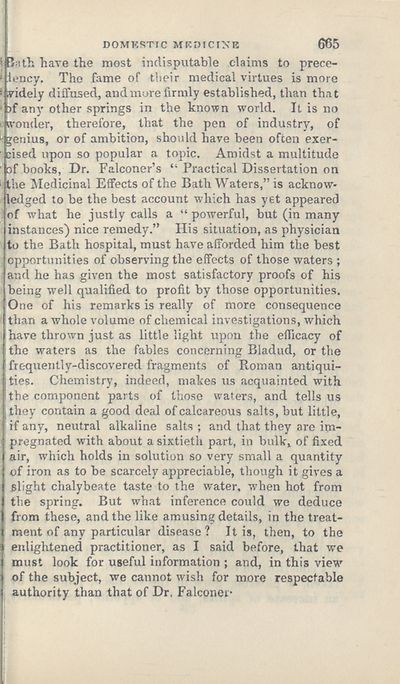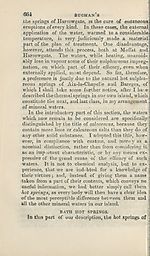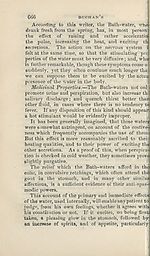Diseases > Domestic medicine
(699)
Download files
Complete book:
Individual page:
Thumbnail gallery: Grid view | List view

Jath hare the most indisputable claims to prece-
lency. Tho fame of tbeir medical virtues is more
videly diffused, and more firmly established, than that
>f any other springs in the known world. It is no
wonder, therefore, that the pen of industry, of
jenius, or of ambition, should have been often exer-
:ised upon so popular a topic. Amidst a multitude
jf books, Dr. Falconer’s “ Practical Dissertation on
the Medicinal Effects of the Bath Waters,” is acknow¬
ledged to be he best account which has yet appeared
of what he justly calls a “ powerful, but (in many
instances) nice remedy.” His situation, as physician
to the Bath hospital, must have afforded him the best
opportunities of observing the effects of those waters ;
and he has given the most satisfactory proofs of his
being well qualified to profit by those opportunities.
One of his remarks is really of more consequence
than a whole volume of chemical investigations, which
have thrown just as little light upon the efficacy of
the waters as the fables concerning Bladud, or the
frequently-discovered fragments of Roman antiqui¬
ties. Chemistry, indeed, makes us acquainted with
the component parts of those waters, and tells us
they contain a good deal of calcareous salts, but little,
if any, neutral alkaline salts ; and that they are im¬
pregnated with about a sixtieth part, in bulk, of fixed
air, which holds in solution so very small a quantity
of iron as to be scarcely appreciable, though it gives a
Blight chalybeate taste to the water, when hot from
the spring. But what inference could we deduce
from these, and the like amusing details, in the treat¬
ment of any particular disease ? It is, then, to the
enlightened practitioner, as I said before, that we
must look for useful information ; and, in this view'
of the subject, we cannot wish for more respectable
I authority than that of Dr. Falconer-
lency. Tho fame of tbeir medical virtues is more
videly diffused, and more firmly established, than that
>f any other springs in the known world. It is no
wonder, therefore, that the pen of industry, of
jenius, or of ambition, should have been often exer-
:ised upon so popular a topic. Amidst a multitude
jf books, Dr. Falconer’s “ Practical Dissertation on
the Medicinal Effects of the Bath Waters,” is acknow¬
ledged to be he best account which has yet appeared
of what he justly calls a “ powerful, but (in many
instances) nice remedy.” His situation, as physician
to the Bath hospital, must have afforded him the best
opportunities of observing the effects of those waters ;
and he has given the most satisfactory proofs of his
being well qualified to profit by those opportunities.
One of his remarks is really of more consequence
than a whole volume of chemical investigations, which
have thrown just as little light upon the efficacy of
the waters as the fables concerning Bladud, or the
frequently-discovered fragments of Roman antiqui¬
ties. Chemistry, indeed, makes us acquainted with
the component parts of those waters, and tells us
they contain a good deal of calcareous salts, but little,
if any, neutral alkaline salts ; and that they are im¬
pregnated with about a sixtieth part, in bulk, of fixed
air, which holds in solution so very small a quantity
of iron as to be scarcely appreciable, though it gives a
Blight chalybeate taste to the water, when hot from
the spring. But what inference could we deduce
from these, and the like amusing details, in the treat¬
ment of any particular disease ? It is, then, to the
enlightened practitioner, as I said before, that we
must look for useful information ; and, in this view'
of the subject, we cannot wish for more respectable
I authority than that of Dr. Falconer-
Set display mode to:
![]() Universal Viewer |
Universal Viewer | ![]() Mirador |
Large image | Transcription
Mirador |
Large image | Transcription
| Antiquarian books of Scotland > Diseases > Domestic medicine > (699) |
|---|
| Permanent URL | https://digital.nls.uk/119896530 |
|---|
| Description | Thousands of printed books from the Antiquarian Books of Scotland collection which dates from 1641 to the 1980s. The collection consists of 14,800 books which were published in Scotland or have a Scottish connection, e.g. through the author, printer or owner. Subjects covered include sport, education, diseases, adventure, occupations, Jacobites, politics and religion. Among the 29 languages represented are English, Gaelic, Italian, French, Russian and Swedish. |
|---|

